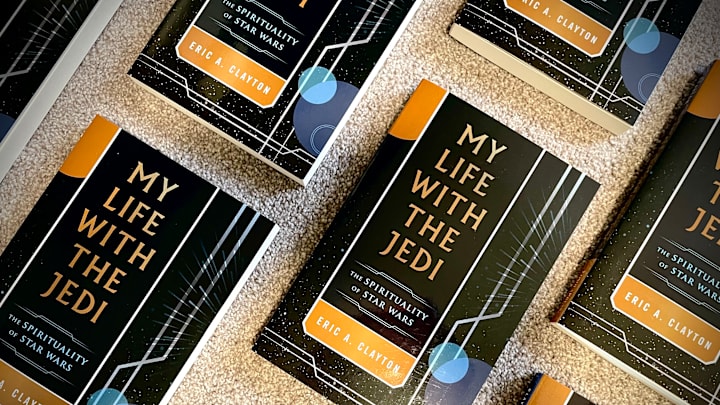There are a lot of reasons why a person might write a book on Star Wars and spirituality. Let me give you one of mine.
It begins with a quote: “The Force is so basic a concept as to be universally appealing,” writes journalist Chris Taylor in his book How Star Wars Conquered the Universe. He goes on to say that the Force is “a religion for the secular age that is so well suited to our times precisely because it is so bereft of detail. Everyone gets to add their own layers of meaning.”
It’s that last bit that really speaks to me: Everyone gets to add their own layers of meaning.
That’s quite the invitation—a challenge, even. It gets you thinking: What layers of meaning might I add? And why?
George Lucas, famously, was influenced by mythologist Joseph Campbell. Myth, religion, legend, and lore—these are building blocks of the Star Wars universe. Lucas wanted his space opera to be a story that invited viewers in, that let them look around and discover what most spoke to them. To find their own balance between warring forces of light and dark. To be challenged to discover their own place as luminous beings within the monomyth of humanity.
“I wanted Star Wars to give people a faraway, exotic environment for their imagination to run free,” Lucas says, quoted in the unofficial oral history book Secrets of the Force by Edward Gross and Mark A. Altman.
That’s a spiritual journey, I think. An invitation to engage our imagination within the framework of a story that demands we dabble in concepts like sacrifice and destiny, hope and purpose. These themes resonate across spiritual traditions the world over. It’s not about which tradition we claim; it’s about bringing our own tradition, our own journey into the conversation, trusting that our stories are worthy enough to add “layers of meaning.”
Star Wars is a playground in which we find more than laser swords and space wizards; we find something of ourselves, something that speaks to who we are, and who we might yet become. We glimpse our own uniqueness within a story that is universal.
I am a student of Ignatian spirituality, a tradition within Christianity that reminds us that the holy is hidden in all things, that all things can conspire together for good if we develop the eyes to see and the disposition to discern, and that—most importantly—we are each beloved creatures with infinite potential. Ignatius of Loyola, the tradition’s namesake, was a soldier-turned-mystic who developed a spiritual system for discerning between the forces of light and dark, most of which he did while living in a cave (though one located in Spain and not Dagobah). Ignatius very well could have been a Jedi.
It’s this tradition that I bring into dialogue with my own love of Star Wars in my new book, My Life with the Jedi: The Spirituality of Star Wars. It’s an exploration not of parallels—though they are inevitable, as the previous paragraph implies—but of practicality. For our own spiritual journey, the kinds of questions worth asking aren’t: What kinds of spiritual leaders also lived in caves? But rather, What might I learn for my own journey from such a cavernous experience?
“Unlike a political platform or a religious tract, Star Wars doesn’t tell you what to think,” writes Harvard professor Cass R. Sunstein in his delightful book, The World According to Star Wars. “It invites speculation. You can understand it in different, even contradictory ways.”
That’s a good thing, I think. It’s freeing. Because my spiritual tradition might not be yours—and that’s good and right. We each bring to our own life stories the distinctiveness of ourselves, just as we bring our own unique views and insights to Star Wars. For a book like mine, I hope a reader is inspired not to find meaning in the exact same places I do but rather to be challenged to add their own layers of meaning from their own unique life journeys. And from there, we all learn; we all benefit. We all have the opportunity to grow.
That, too, is a challenge. And I think a shared love of Star Wars provides a perfect gateway into such meaning-making.
Learn more about and grab your own copy of My Life with the Jedi: The Spirituality of Star Wars here.
